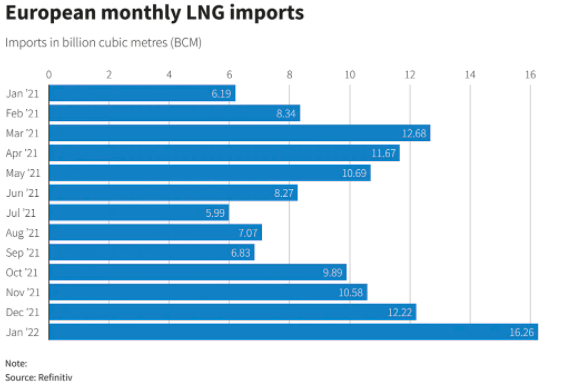Foreign Secretary Liz Truss backs energy sanctions against Russia

Foreign Secretary Liz Truss has called for limits on oil and gas imports from Russia, following the country’s invasion of Ukraine.
Truss told Sky News that the G7 nations needed to reduce their dependency on Russian fossil fuels.
She said: “I would support the idea of having ceilings on how much oil and gas is imported from Russia.”
This follows consistent warnings from Prime Minister Boris Johnson that Europe had to cut down its reliance on Russian natural gas supplies, to ensure the continent could stand up to escalating aggression from the Kremlin.
Yesterday, the West further tightened its sanctions against Russia, omitting multiple Russian banks from the SWIFT international payment system, which will make it harder for Russia to trade and for its companies to do business.
“We will hold Russia to account and collectively ensure that this war is a strategic failure for Putin,” said the leaders of the European Commission, France, Germany, Italy, Britain, Canada and the US.

The statement did not reveal the banks that would be expelled, but an EU diplomat has since outlined that 70 per cent of the Russian banking market would be affected.
The group also said it would impose restrictions on Russia’s central bank to limit its ability to support the rouble and finance Putin’s war effort with its $630bn of reserves.
However, the West has continued to avoid any measures that could prevent Europe purchasing energy from the country.
The continent relies on Russia for around 40 per cent of its natural gas supplies, and has already suffered this winter amid shortening supplies from Gazprom – relying on LNG top-us from the US.

By contrast, the UK only relies on Russia for five per cent of its natural gas, with the bulk of its resources coming from both Norway and its North Sea assets.
The White House has confirmed to reporters the measures will exclude energy, likely carving out energy-focused banks from the measures or using product definitions in the SWIFT system to ensure transactions can continue.
Western allies to Ukraine have also authorised more weapons transfers to help Ukraine fight.
Gas flows remain stable despite escalating conflict
Russian forces have been targeting oil and gas installations across Ukraine, with the Kremlin ramping up hostility as its invasion enters a fourth day.
A Russian missile strike set an oil terminal ablaze in Vasylkiv, southwest of the capital, Kyiv, while Russian troops blew up a natural gas pipeline in Kharkiv.
The blast reportedly sent a cloud up into the darkness, though Ukraine’s gas pipeline operator said the transit of Russian gas to Europe via Ukraine was still going on as normal.
Kremlin-backed energy giant Gazprom also revealed that Russian gas exports via Ukraine to Europe continue to flow as expected.
It said requests for gas via the route stand at 107.5m cubic metres as of Sunday – in line with customer requests.
Russian-backed separatists in the eastern province of Luhansk have also claimed that a Ukrainian missile had blown up an oil terminal in the town of Rovenky.
Casualties from the conflict have continued to rise, with the UN reporting at least 240 civilian casualties, with over 100,000 people fleeing to neighbouring countries
One of Ukraine’s presidential advisers has revealed over 3,500 Russian soldiers have been killed or wounded, with Western officials stating that its latest intelligence suggests Russia has suffered higher casualties than expected.